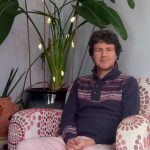Welcome to our new series, The Friday Prof-ile – a chance to get to know some of our recently appointed Professors and Associate Professors a little better. Every Friday, we’ll be asking a different person the same set of questions to get an insight into their life, work and what makes them tick.
This week, we’re chatting with Associate Professor in English, Sam Goodman.

Sam Goodman
What are your research interests? What made you want to study these areas?
I have always been interested in Britishness and national identity, and this is the broad umbrella under which all my research has tended to take place, whether about twentieth-century and contemporary literature and culture, or the work I have done on alcohol, medicine, and colonial India.
I think I’ve always been interested in this subject because Britain has been in the midst of an identity crisis for what has seemed like the entirety of my adult life – this crisis has been going on since the end of the Second World War and the end of the British Empire but seemed to become acute from the 1990s onwards what with the nostalgia of ‘Cool Britannia’ and the growing popularity of historical fictions, the rebooting of so-called quintessentially British characters like James Bond, jubilees, the Olympics, and also the rhetoric leading up to Brexit. I suppose I’ve always been interested in (as Patrick Wright puts it) what it means to live in an old country, and how that affects the literature, culture and identities of the people within it.
What has been your career highlight to date?
So many come to mind! In research terms, I’ve been lucky enough to have been able to go to conferences and visit archives in various parts of the world, and having the chance to read through Ian Fleming’s papers in the US, or J. G. Farrell’s manuscripts in Trinity College library, Dublin was really exciting. Appearing at the Hay Festival and all the work I have done with the BBC has definitely been a highlight too – especially attending the Leicester Square premiere of Spectre, even though I wasn’t allowed to talk about it for a week afterwards!
When it comes to teaching, it has to be the writing and development of the unit Media & Trauma with my colleague Ann Luce – working on this unit made me think differently not just about how I teach, but about how a trauma-informed approach to working with people and tackling challenging subjects makes such an enormous difference to student wellbeing and the campus community as well as society more widely.
What are you working on at the moment?
As it happens, my latest book, The Retrospective Raj: Medicine, Literature and History After Empire, was just published with Edinburgh University Press so I am at a point where I’m taking a (much-needed) breather and considering my next long term project. In the meantime, I’m editing a special issue for the Journal of the Social History of Medicine, I have just submitted a piece on colonial memoir to Literature & History, sent off a public-facing article for The Cats Protection magazine, and I am now working on an article on space and place in the novels of Graham Swift.
If you weren’t an academic, what would you be doing?
Working with animals in some capacity. I always had notions of being a vet but was never good enough at science GCSE… I could definitely see myself working for a charity or for a foundation somewhere though.
What do you do to unwind?
Anything that takes me away from looking at a screen! I’ve long been a runner, and like a lot of people I ran miles and miles in lockdown which was a great way to clear my head at the end of a working day, and meant I got to explore new places near me I’d never been to before. I’m also a drummer, much to the delight of my neighbours.
What’s the best thing about Bournemouth?
For me, it’s Charminster. I’ve always loved the international shops and restaurants of Charminster; I love to cook, so it’s a great place for ingredients and inspiration.
If you could pick any superpower, what would it be and why?
Eidetic memory; it would make archival trips just so much easier…
If you were stranded on a desert island, what one luxury item would you take with you?
A cafetière and lifetime supply of dark roast; I’m approximately 70% coffee and wouldn’t survive without it.
What advice would you give to your younger self?
Keep your vinyl; MiniDisc is a scam.
If you’re a recently appointed Professor or Associate Professor and you’d like to be featured in the series, please contact research@bournemouth.ac.uk to find out more and get involved.
 The Friday Prof-ile: Mel Hughes
The Friday Prof-ile: Mel Hughes The Friday Prof-ile: Christa Van Raalte
The Friday Prof-ile: Christa Van Raalte The Friday Prof-ile: Roman Gerodimos
The Friday Prof-ile: Roman Gerodimos The Friday Prof-ile: Hywel Dix
The Friday Prof-ile: Hywel Dix










 Conversation article: Why so many people drown at the water’s edge
Conversation article: Why so many people drown at the water’s edge Workshop on longitudinal studies in three countries
Workshop on longitudinal studies in three countries New Bournemouth University public health paper
New Bournemouth University public health paper New ACORN-funded paper published. When time is short but passion for food is strong, food day-tripping may be the answer!
New ACORN-funded paper published. When time is short but passion for food is strong, food day-tripping may be the answer! Royal Society of Chemistry Outreach Fund: Open for Applications
Royal Society of Chemistry Outreach Fund: Open for Applications Last reminder – MSCA Postdoctoral Fellowships 2024 internal deadline next week
Last reminder – MSCA Postdoctoral Fellowships 2024 internal deadline next week Horizon Europe – EuroHPC and MSCA PF webinars
Horizon Europe – EuroHPC and MSCA PF webinars